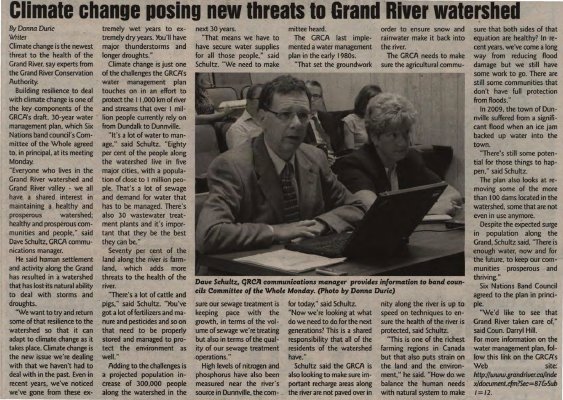"Climate change posing new threats to Grand River watershed"
- Publication
- Turtle Island News, 13 Aug 2014
- Full Text
- Climate change posing new threats to Grand River watershedBy Donna Duric, Writer
Climate change is the newest threat to the health of the Grand River, say experts from the Grand River Conservation Authority.
Building resilience to deal with climate change is one of the key components of the GRCA's draft, 30-year water management plan, which Six Nations band council's Committee of the Whole agreed to, in principal, at its meeting Monday.
"Everyone who lives in the Grand River watershed and Grand River valley - we all have a shared interest in maintaining a healthy and prosperous watershed; healthy and prosperous communities and people," said Dave Schultz, GRCA communications manager.
He said human settlement and activity along the Grand has resulted in a watershed that has lost its natural ability to deal with storms and droughts.
"We want to try and return some of that resilience to the watershed so that it can adapt to climate change as it takes place. Climate change is the new issue we're dealing with that we haven't had to deal with in the past. Even in recent years, we've noticed we've gone from these extremely wet years to extremely dry years. You'll have major thunderstorms and longer droughts."
Climate change is just one of the challenges the GRCA's water management plan touches on in an effort to protect the 11,000 km of river and streams that over 1 million people currently rely on from Dundalk to Dunnville.
"It's a lot of water to manage," said Schultz. "Eighty per cent of the people along the watershed live in five major cities, with a population of close to 1 million people. That's a lot of sewage and demand for water that has to be managed. There's also 30 wastewater treatment plants and it's important that they be the best they can be."
Seventy per cent of the land along the river is farmland, which adds more threats to the health of the river.
"There's a lot of cattle and pigs," said Schultz. "You've got a lot of fertilizers and manure and pesticides and so on that need to be properly stored and managed to protect the environment as well."
Adding to the challenges is a projected population increase of 300,000 people along the watershed in the next 30 years.
"That means we have to have secure water supplies for all those people," said Schultz. "We need to make sure our sewage treatment is keeping pace with the growth in terms of the volume of sewage we're treating but also in terms of the quality of our sewage treatment operations."
High levels of nitrogen and phosphorus have also been measured near the river's source in Dunnville the committee heard.
The GRCA last implemented a water management plan in the early 1980s.
"That set the groundwork for today," said Schultz.
"Now we're looking at what do we need to do for the next generations? This is a shared responsibility that all of the residents of the watershed have."
Schultz said the GRCA is also looking to make sure important recharge areas along the river are not paved over in order to ensure snow and rainwater make it back into the river.
The GRCA needs to make sure the agricultural community along the river is up to speed on techniques to ensure the health of the river is protected, said Schultz.
"This is one of the richest farming regions in Canada but that also puts strain on the land and the environment," he said. "How do we balance the human needs with natural system to make sure that both sides of that equation are healthy? In recent years, we've come a long way from reducing flood damage but we still have some work to go. There are still some communities that don't have full protection from floods."
In 2009, the town of Dunnville suffered from a significant flood when an ice jam backed up water into the town.
"There's still some potential for those things to happen," said Schultz.
The plan also looks at removing some of the more than 100 dams located in the watershed, some that are not even in use anymore.
Despite the expected surge in population along the Grand, Schultz said, "There is enough water, now and for the future, to keep our communities prosperous and thriving."
Six Nations Band Council agreed to the plan in principle.
"We'd like to see that Grand River taken care of," said Coun. Darryl Hill.
For more information on the water management plan, follow this link on the GRCA's Web site: http://www.grandriuer.ca/index/document.cfm?Sec=B7&Sub1=12.
- Creator
- Duric, Donna, Author
- Media Type
- Text
- Newspaper
- Item Type
- Clippings
- Publisher
- Turtle Island News
- Place of Publication
- Six Nations of the Grand River, ON
- Date of Publication
- 13 Aug 2014
- Date Of Event
- 11 Aug 2014
- Subject(s)
- Personal Name(s)
- Schultz, Dave ; Hill, Darryl.
- Corporate Name(s)
- Grand River Conservation Authority ; Six Nations Elected Band Council.
- Local identifier
- SNPL004857v00d
- Language of Item
- English
- Creative Commons licence
 [more details]
[more details]- Copyright Statement
- Public domain: Copyright has expired according to Canadian law. No restrictions on use.
- Copyright Date
- 2014
- Copyright Holder
- Turtle Island News
- Contact
- Six Nations Public LibraryEmail:info@snpl.ca
Website:
Agency street/mail address:1679 Chiefswood Rd
PO Box 149
Ohsweken, ON N0A 1M0
519-445-2954



